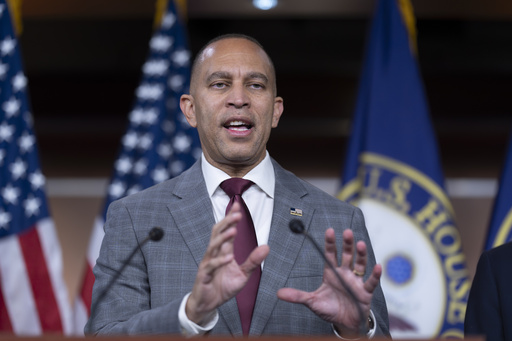A contentious discussion regarding the debt ceiling is significantly impacting negotiations surrounding government funding and is bringing Washington closer to a potential federal government shutdown.
President-elect Donald Trump has insisted on incorporating a provision to raise or suspend the nation’s debt limit—something typically resisted by his party—into any legislation aimed at preventing a shutdown. In a statement released on Wednesday, Trump claimed, “Anything else is a betrayal of our country.”
In response to Trump’s demands, Republicans included a clause in a revised government funding bill that proposed suspending the debt ceiling for two years, extending it until January 30, 2027. However, this bill faced a resounding defeat in a House vote held on Thursday night, leaving the path forward unclear.
Understanding the nuances behind the debt ceiling debate is crucial in the ongoing shutdown situation. The debt ceiling is the maximum amount of money the United States government is permitted to borrow to fulfill its legal obligations. For the Treasury Department to exceed this amount, Congress must authorize a raise in the limit.
Currently, the federal debt is approximately $36 trillion, with increased inflation post-pandemic raising government borrowing costs. This is expected to result in debt servicing next year consuming more funding than national security expenditures. The last increase in the debt limit occurred in June 2023 when it was suspended until January 1, 2025, at which point it will automatically adjust to match the total debt that the Treasury has incurred.
Recently, the debt limit votes have been used strategically as a bargaining chip, allowing legislators to attach additional priorities to a bill that is necessary to pass.
The debt ceiling struggle aligns with Trump’s assertion that any resolution regarding government funding should also address the debt ceiling. He expressed his desire for this issue to be resolved before he takes office next month, criticizing Congress if they neglect this demand. During an interview with Fox News Digital, Trump warned Republicans, particularly House Speaker Mike Johnson, that supporting a bill that does not address the debt ceiling would warrant political repercussions.
If the debt ceiling is not raised, the government could face a default on its obligations, a scenario that has not happened in history. Treasury Secretary Janet Yellen and economic analysts have deemed such an event as potentially “catastrophic” for both the U.S. economy and financial markets.
Importantly, raising or suspending the debt limit does not equate to sanctioning new spending or tax reductions; it merely enables the government to fulfill existing commitments based on prior budgetary decisions. Some have even proposed eliminating the debt limit entirely due to these complexities.
Implications for Speaker Mike Johnson could be significant as he seeks to retain his position in the new Congress starting January 3. Early Thursday, Trump expressed confidence that Johnson could maintain his role if he promptly and effectively addresses the debt ceiling increase. This expectation, however, comes right before the holiday season, further complicating matters for the speaker.
Previously, Johnson’s predecessor, Kevin McCarthy, spent considerable time collaborating with President Joe Biden to raise the debt limit, eventually agreeing to a bipartisan deal that prioritized spending cuts in exchange for elevated borrowing capacity. Nonetheless, many House Republicans found this agreement insufficient, leading to McCarthy’s removal from the role.
As the clock ticks toward a potential government shutdown, Trump is now pressuring Johnson to implement a debt ceiling extension before it occurs.
Democratic leaders have clearly articulated their stance on the situation. After recent discussions, Democratic Leader Hakeem Jeffries dismissed any possibility of his party intervening to assist Republicans, particularly with the looming threat of a shutdown. Jeffries remarked on social media that, “GOP extremists want House Democrats to raise the debt ceiling so that House Republicans can lower the amount of your Social Security check,” which he deemed unacceptable.
He, along with other Democrats, conveyed that Republicans ought to adhere to the previously negotiated spending agreements, describing the newly proposed GOP plan as “laughable.”
